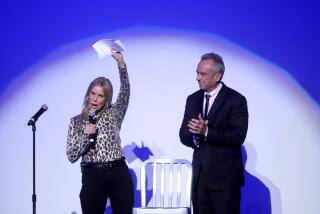Clinton Visits University, Wins Cheers for First Lady’s Role
- Share via
TOKYO — When the late Robert F. Kennedy visited Waseda University in 1962 as attorney general, hostile students jeered and shouted slogans against the U.S.-Japan Security Treaty and cut off his microphone.
Today, when President Clinton became the first American official since Kennedy to visit Waseda, the topic that got the most attention was First Lady Hillary Rodham Clinton, who sat in the audience.
About 1,000 students and 500 invited guests listened quietly to Clinton’s economic speech. But when Clinton came down from the podium for one of his patented “town hall” question-and-answer sessions with the students, the listlessness disappeared.
The last of five questions, delivered in fluent English by a female student, provoked a wave of laughter. And Clinton’s reply produced the biggest applause he got throughout the 53-minute appearance.
The questioner informed Clinton that many people in Japan think that women should quit working after they marry and asked what American people think about his wife giving political speeches. He also was asked how he rated his wife as a political partner.
“Many people think she is the real lawyer in the family” despite his own legal qualifications, Clinton said. “I chose her to be in charge of health care because she was better qualified than anyone I know.”
Although American critics of what Mrs. Clinton is doing cite the spouse issue as the reason for their complaints, most of them are actually opposed to the policies he and his wife are espousing, he added.
Predicting that a woman eventually will be elected President of the United States, Clinton said that Japan, with its low birthrate and its long life expectancy, “will have to take advantage of the skills of women” if it wants to continue to grow economically.
He also was asked about human rights, unification of Korea (by a student from South Korea), and the marriage of Crown Prince Naruhito and Princess Masako. Only one student, a woman, asked a critical question. She accused him of ordering a June 27 bombing attack on Iraq because of “discrimination by Caucasians.”
Clinton denied that any ethnic or religious discrimination was involved in the attack on Baghdad, ordered in retaliation for an Iraqi plot to assassinate former President Bush during a visit to Kuwait.
A student in the Waseda politics-economics department said he had come to hear Clinton’s speech “because I want to be a diplomat.”
Two students in the engineering department said they agreed with Clinton’s trade complaints against Japan but added that Japan cannot afford to open its rice market to imports. “Our agriculture would be destroyed,” one of them said. In his speech, Clinton did not mention rice.
Another student said he came because Clinton is President of the United States.
The apolitical nonchalance underscored the wave of change that has occurred both in Japan and in the U.S.-Japan relationship since the historical Kennedy visit.
Although Waseda was widely known as the hotbed of anti-American activism in the 1950s and 1960s, students were allowed in without restrictions until the auditorium overflowed to hear Kennedy’s speech. An estimated 4,000--far more than capacity--attended. Today, security was so tight that students, chosen to attend through a lottery, left about 400 seats empty. The student portion of the crowd numbered only 1,500 or so.
The jeers and shouts of “Yankee go home” of 1962 were missing. But so was the applause. Clinton’s speech stirred no reaction until the end.
Kennedy’s appearance came in an era in which young Japanese, only 17 years away from Japan’s 1945 defeat in World War II, were worried that Japan’s security treaty with the United States would embroil them in a war of America’s making. Only two years before the debacle at Waseda, demonstrations against the government of Prime Minister Nobusuke Kishi and the revision of the treaty forced Kishi to cancel the only Japan trip an American President--the late Dwight D. Eisenhower--had ever planned.
More to Read
Sign up for Essential California
The most important California stories and recommendations in your inbox every morning.
You may occasionally receive promotional content from the Los Angeles Times.












